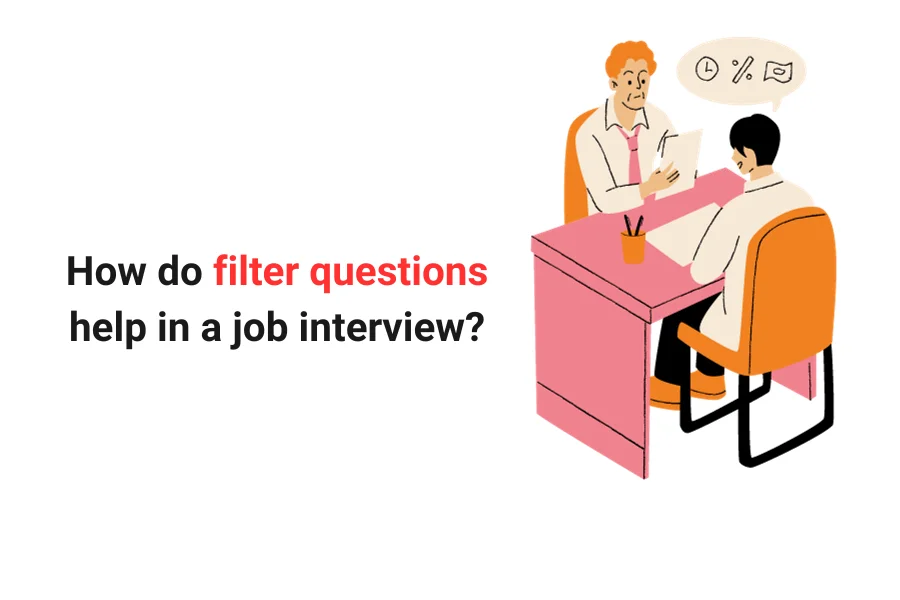Do you need to fill a vacancy on your team and are under pressure to find the right candidate for that job? That is, a person who has all the necessary skills and experience. But can you find this candidate in an interview? Of course, it is possible if you ask killer questions.
What are the killer questions in interview?
Killer questions help you go deeper into an interview. Which will give you a good idea of whether that potential candidate could be a successful member of your team.
Table of Contents
What are killer questions or Filter questions?
The killer questions have been designed to speed up the task of recruiters. That is, these questions help to more quickly identify the candidates who best fit a job position.
On the other hand, killer questions also help to discard those applicants who do not meet certain fundamental criteria. For this reason, these questions are an important part of the recruitment and selection process.
Regarding the term “filter”, it refers to the ability of these questions to eliminate candidates. This way, those applicants who do not meet the key requirements are discarded. For example:
- Technical skills
- Relevant experience
- Cultural values
Thus, with killer questions, recruiters save time and resources. Of course, by focusing on those candidates with the greatest potential to fill the required positions in the company organization chart.
Related: Crowdsourcing in recruitment and selection.

Why are killer questions so useful in job interviews?
There are several reasons that determine the importance of using killer questions in job interviews.
Efficient personnel selection
By using killer questions, recruiters more quickly identify candidates who meet the essential requirements of the position. This saves time by discarding those candidates who are not suitable for that position from the beginning .
Focus on suitable candidates
By using killer questions, interviewers focus on those candidates with the greatest potential.
It helps to choose the best fit potential candidates for the company and the job. In this way, the quality of the recruitment and selection process is improved by reducing the probability of interviewing unsuitable candidates.
Greater objectivity
From the beginning, one of the priorities of a selection process is to identify the candidate’s technical skills. In addition to experience and cultural values. This helps reduce biases in the selection process, to make more objective decisions.
Save time and resources
As we well know, a selection process can be costly in terms of time and money. Therefore, companies seek to optimize this stage, to reduce the costs associated with interviewing and evaluating candidates. Well, one of its objectives is to accelerate decision-making.
Improve candidate experience
Killer questions prevent candidates who are not suitable for the position from wasting time and energy. Since this selection process will not lead to a job offer.
In some ways, this tactic contributes to a more positive candidate experience. Which becomes a way to improve the company’s reputation in the labor market.
What are the most frequently asked filter questions?
Whether as a recruiter or business owner, when interviewing candidates you want to identify the best ones. The most frequently asked filter questions are:
1. What do you know about our company and why do you want to work here?
With all the information that exists online, it is easy to think that candidates will try to get to know the company better. However it is not always so. So it is not unusual to find that some candidates do not even know what type of business the company does.
2. What skills and strengths can you bring to this position?
With this question you find out if the candidate applied considering that their skills adapt to the needs of the company. Or he just applied for the vacancy on impulse.
3. Can you tell me a little about your current work?
This is an excellent question that will help you evaluate the potential employee’s communication skills. In addition, it allows you to obtain background information that goes beyond your professional profile or resume.
4. What could your current company do to be more successful?
Before hiring, you want to know if that candidate is able to see the big picture of your company. You’ll also want to know a little about the reasons why he wants to leave his current job.
5. Where do you see yourself in five years?
A candidate with professional growth goals can become a valuable asset for your company. So try to look for someone committed to their career and with clear goals.
As an added point, try to mention how your company can help you achieve those goals.
When a potential candidate wants to advance in their career, it is necessary to help them see growth opportunities in your company. This increases the chances that you will be happy and stay long term.
6. Do you have any question for me?
With that question the interview concludes. So more serious candidates may have some questions for the hiring manager.
However, if the discussion was long and detailed, perhaps the candidate has already asked his questions. So it’s okay if at the end of the interview the candidate doesn’t ask anything.

Filter vs. Leading questions vs. Trick questions: which one to use in HR?
As you try to get the best result during interviews, it is important to know what type of questions to ask.
Although they may have their similarities, there are three types of questions to identify skills and interests in a person. Human Resources consultants usually handle them with agility.
Filter questions
If you want to identify potential candidates for the position faster, then killer questions are indicated.
Trick questions
With these questions you evaluate candidates’ creativity and problem-solving ability.
While they are useful for specific roles that require these skills, they are generally not recommended. If you ask leading questions in a standard job interview, candidates may be confused or discouraged.
Leading questions
Use these questions to put candidates in an uncomfortable situation. This way you realize how they react to pressure and what their ability is to handle difficult situations.
In general, these questions are not recommended as they create unnecessary tension. Furthermore, they move away from a positive and respectful interview approach.
An example of a leading question could be the following:
“Tell me about a major conflict you once had with a colleague and how you resolved it.”
So, in most cases, it is preferable to use filter questions or killer questions. Well, these are objective, relevant and help identify the most suitable candidates for the role.
Therefore, leading questions and trap questions should be used with caution. And only in situations appropriate for the role in question.
Example of using killer questions in a job interview
In the following example we show you how killer questions can be used during a job interview.
The new role they want to hire for is sales manager. So, to optimize this selection process, recruiters use the following killer questions.
Here are some killer questions examples:
What is your experience in leading sales teams in the technology industry?
Recruiters want to know if the candidate has relevant experience in this industry or in a similar role. Therefore, with your answer you will find out if you meet one of the fundamental requirements for this position.
Can you share an example of how you have worked closely with other teams to achieve sales goals?
The interviewer assesses the candidate’s ability to collaborate and communicate effectively in an interdisciplinary team environment. Well, this is a very important criterion in most organizations.
According to a publication in Zippia, companies with a collaborative environment are 30% more innovative. Likewise, their productivity exceeds those of companies that do not encourage collaboration by 36%.
Can you share an experience in which you were able to turn a negative situation with a client into a lasting relationship?
Here the candidate’s ability to manage difficult situations is evaluated. Your ability to maintain positive relationships with customers is also discussed. Well, for every business it is crucial to keep happy and satisfied customers.
Here are some more engaging but tricky killer interview questions to ask employees:
- What motivates you to excel in your work?
- Tell me about a time you had to learn a new skill quickly.
- How do you handle feedback, both positive and negative?
- What are your salary expectations and career aspirations?
- What would you like to know about our company and this role?
Conclusion: Killer questions in Interview
Understanding and utilizing killer questions in interviews is a powerful tool for HR professionals. These insightful inquiries not only reveal a candidate’s true potential but also assist HR in making informed decisions.
By mastering the art of asking the right questions, HR professionals can shape a more effective hiring process, ensuring the selection of candidates who not only fit the job description but also contribute to the overall success and growth of the organization. Empower your hiring strategy with the art of asking killer questions and watch your team thrive.
PITCS is one of the best interview outsourcing company Bangalore that you can trust.



![Read more about the article 6 Amazing Recruitment Process Outsourcing Benefits [RPO]](https://pitcs.in/wp-content/uploads/2022/02/1-300x169.png)
